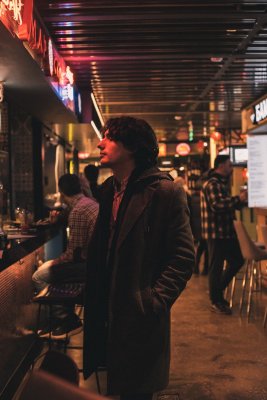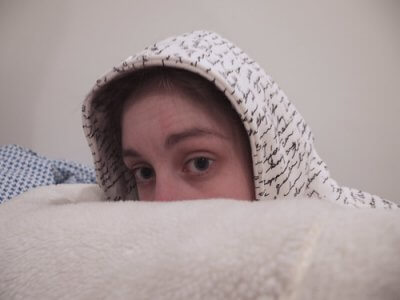Re-Entry Anxiety – Does ‘Getting Back to Normal’ Leave You Cold?

photo by: Alina Rubo
by Hugh Wilson
After a year of lockdowns and social distancing, we’re all ready to leap back into our stalled social lives and make up for lost time, right? Not necessarily. Welcome to the rise of ‘re-entry anxiety‘.
What is ‘re-entry anxiety’?
Don’t feel like sprinting through the doors of the nearest pub, restaurant or cinema as soon as it’s legal to do so? Does the whole thing feels a bit too soon, and a bit too scary?
‘Re-entry anxiety’– symptoms of anxiety caused by the thought of getting back to life like it was before the pandemic — is common, and, according to experts, entirely normal.
Across the ocean, for example, a large-scale poll by the American Psychological Association (APA) found that, “Nearly half of Americans (49%) feel uneasy about adjusting to in-person interaction once the pandemic ends.”
But the virus doesn’t scare me anymore, why do I still feel anxious?
Here in the UK, worries about the actual virus itself are dropping. British polling firm Ipsos MORI confirmed in March of this year that only 42 per cent of us reported still being concerned, compared to 72 percent one month earlier.
So then shouldn’t we be less anxious now than when the first lockdown eased last summer, and three in five of us felt uncomfortable using public transport or going to bars and restaurants?
Not necessarily. The same American study above, for example, found that anxiety about getting back to life ‘as before’ was not lowered even if citizens had had a vaccine. Adults who received a COVID-19 vaccine were found to be just as likely as those who have not received a vaccine to say they were anxious (48% vs. 49%, respectively).
Re-entry anxiety goes deeper than a natural instinct for self-preservation. We can feel oddly unable to contemplate the simple joy of a bustling bar, busy office or hushed theatre for very different reasons.
Pandemic fatigue
Humans are social animals that find comfort in routine. A 2018 study published in the Personality and Social Psychology bulletin even found that we are more inclined to feel life has more meaning if we are following a typical routine.
But these mental pillars were brutally swept from under us when Covid struck. Lockdown created an epidemic of stress as our brains adjusted to new routines, and narrowing horizons.
But adjust they did. In some cases, perhaps too well. We told ourselves that Zoom quizzes and home working were lifesavers, which of course they were. We became habituated to this new reality.
And now? Well, now we’re telling ourselves to turn the world upside down all over again.
Change is unsettling
Forget Covid for a second, and imagine changing jobs twice in a year, or moving house in March and again 12 months later. Significant life changes are anxiety-inducing, even when the change promises something better.
Adjusting to Covid was a significant life change, and reemerging from lockdown will be as well. A degree of anxiety is only to be expected.
Fear of the unknown

By: Dmytro Kyryliouk
Despite all the talk of ‘getting back to normal’, we’re likely to re-emerge into a world that is very different from the one we left behind.
For example, will you go back to the office full time, part-time, or not at all? At the moment, you might not know.
Many businesses seem to want to adopt a hybrid working model for the post-pandemic period, which means splitting your working week between the office and home. That’s a good compromise, but it’s also another entirely new routine you’ll have to get used to.
And when you are in the office, how do you safely and respectfully interact with colleagues? For that matter, how do you discourage more gung-ho members of staff from flouting social distancing rules? And communicate your discomfort without coming across as unfriendly?
The concept of ‘personal space’ may also radically change. Socialising will return, but with new conventions around everything from shaking hands to sharing starters.
It’s a lot to think about and, for many, a lot to feel anxious about, too.
Re-entry anxiety is also social anxiety
As all this suggests, re-entry anxiety is, in part, a form of social anxiety. Social anxiety disorder is a very real mental health condition based on a fear of being watched and judged by others. It can lead you to avoid situations that involve meeting new people or having new experiences.
Lockdown seems to have been a sort of unexpected respite for many social anxiety sufferers. A Chinese research study involving almost two thousand adults confirmed, for example, that distancing could “serve as a mediator in the relationship between pandemic severity and social anxiety”.
The carpe diem expectation to socialise after lockdown could mean your social anxiety is suddenly supercharged. Situations that were once familiar and comfortable will seem new and unsettling again. Something as simple as getting on a train or going to the supermarket may be fraught with anxiety.
Social invitations after lockdown might feel a double edged sword. Accepting them will make sufferers anxious. Refusing them risks being judged standoffish, or labeled paranoid or antisocial.
How you can counter re-entry anxiety
With all that on our minds, it’s hardly surprising that many people are starting to feel anxious about the great reopening. The question is, what to do about it?
1. Start small.
 If you’re anxious, take re-entry slowly. Agree to meet one friend, outside, for a coffee. When you’re comfortable with that, make it two friends. And so on.
If you’re anxious, take re-entry slowly. Agree to meet one friend, outside, for a coffee. When you’re comfortable with that, make it two friends. And so on.
Time these incursions into normality carefully. Make your first foray into a pub garden at a time of day when it won’t be busy (think Tuesday lunchtime, not Friday evening). Take small steps, but don’t stand still.
2. Talk it through.
If friends or family try to push you faster than you want to go, explain your anxiety and the reason for your reticence. They may even be relieved to have found an ally in their own cautious return.
Talk to your boss, too. If your employer wants you back in the office, can you start with a day or two a week? Could your hours be staggered so you can travel at times when public transport will be quieter?
3. Control what you can control.
Accept what you can’t control, and then control what you can. That’s quite a lot. For example, you can use hand sanitiser and stick to social distancing, even if others don’t. You can avoid crowded indoor venues (when they’re allowed to open) and only meet outside for the time being.
4. Seek professional help
For most of us, a measured and gradual approach to re-entering the world will keep anxiety to an acceptable level, letting us acclimatise at our own pace.
For others, particularly if you have a history with anxiety and/or social anxiety, re-entry anxiety could become debilitating. In that case, don’t overlook professional support. A talk therapist can help you with tools for managing your anxious thoughts and coping with stressful situations.
Need to talk to someone confidentially about your re-entry anxiety? We connect you with highly regarded London-based talk therapists. Or use our booking platform to find UK therapists and online counsellors.
Still have a question about re-entry anxiety? Ask below. Please note we cannot offer free counselling via comments.
 Hugh Wilson is a freelance journalist based in West Yorkshire. He writes about parenting, health, business, technology, and workplace issues.
Hugh Wilson is a freelance journalist based in West Yorkshire. He writes about parenting, health, business, technology, and workplace issues.




